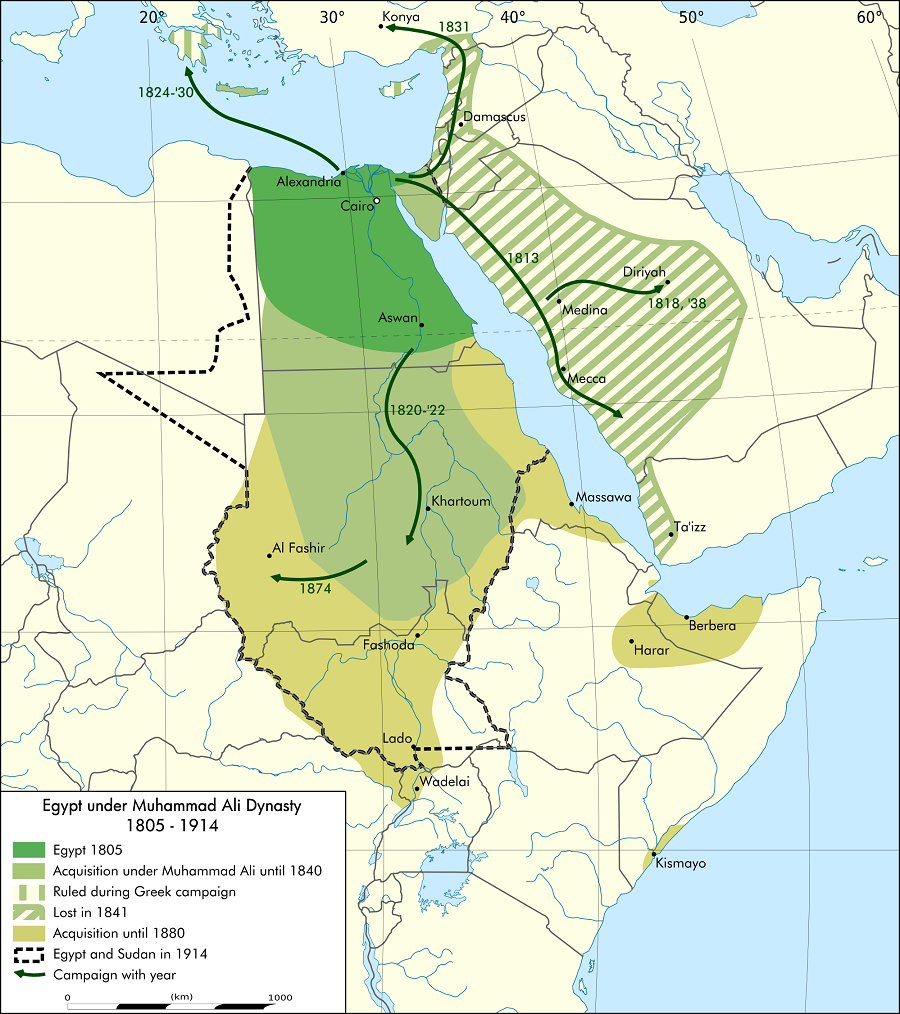This series has seven easy 5 minute installments. This first installment: Egypt’s Financial Problems.
Introduction
The dealings between England and Egypt in 1881-1885 present a singular combination and conflict of ancient and modern forces. On the one hand, the primary difficulty arose from the conditions of world-wide finance peculiar to modern times. English forces were sent into Egypt to secure the payment of loans by establishing such governmental conditions as would prevent idleness on the part of the people and wasteful ness on the part of the officials. And the construction of the Suez Canal had given the Powers of Western Europe a new and most important interest in peace and wise government for Egypt. On the other hand, the English army was confronted by a formidable force commanded by a pretended prophet, known as the Mahdi, and actuated by deep-rooted superstition and religious frenzy. The disasters that are so common when an army in the field is dependent upon and controlled by a distant civilian government, were not wanting here; and final victory was attained only after the armies of Hicks Pacha and Baker Pacha had been destroyed by the Mahdists and Khartum had fallen. General Gordon, heroically holding that important post at the great forks of the Nile, and looking anxiously for the relief expedition which official blundering delayed until it was two days too late, is one of the most pathetic figures in history.
This selection is from History of England by James Franck Bright published in 1893. For works benefiting from the latest research see the “More information” section at the bottom of these pages.
James Franck Bright (1832-1920) was Master of University College, Oxford. His field was history.

The attitude of the Porte in the Egyptian difficulties that arose in 1881 was the natural result of its desire to assert its sovereignty in Egypt, its extreme unwillingness to admit European interference, and its luke-warmness in using its influence and arms to restore order. No less natural was the wish of Lord Granville and the English Cabinet to restore the self-respect of the Turkish Government, and, by acknowledging and making use both of its influence and arms in Egypt, to attempt to remove the soreness caused by the late events.
The Conservative Government had left its successor a difficult problem in Egypt. The great financial interests at stake had induced the European Powers to interfere in the country, to restrain the wild misgovernment and spendthrift extravagance of Ismail. It had, however, been generally acknowledged that France, as the great Mediterranean Power with an Egyptian connection of long standing, and England, as the ruler of India, had more than mere financial interests at stake in the well-being of Egypt. An agreement had been made by which a joint control exercised by France and England had been established. Ismail having been removed from the throne in June, 1879, it was under this dual superintendence that his son Tewfik was called upon to govern his dominions. There was a strong feeling in England in favor of the assumption of some more complete command in the country, either by direct annexation or under some form of protectorate; but, on the other hand, there was among a large section of the Liberals a dislike to any addition to the responsibilities of the empire. Between these two extremes of party feeling the new ministers had to steer their way. They accepted at first, in this, as in other cases, the action of their predecessors. But they refused to go a step beyond it. Their efforts were directed to honest cooperation with France in carrying out a work entrusted to them by the European Powers. This work they regarded as the supervision of the Egyptian Government. They would listen to no suggestion of taking any part of that government upon themselves. It is obvious that the line they adopted was in the last degree critical. Differences of opinion might at any moment arise between themselves and their French colleagues; the direction of a government by moral suasion, and without the use of force, is likely either to be ineffective or by gradual steps to lose its purely persuasive character. It took nearly the whole of their tenure of power, a period of checkered fortune and much disaster and much mismanagement, to clear away these difficulties and enable England to carry out its task of Egyptian regeneration.
As has been said, Europe had interfered upon financial grounds. Before any reforms in administration or justice could be carried out, something like equilibrium had to be established between the revenue and the expenses. The first great step in this direction was made when the International Commission of Liquidation was appointed in April, 1880, and when, on its report in July, the Law of Liquidation was promulgated. This law, which, although it has been modified, is still the basis of the financial arrangements of Egypt, was virtually a composition on the part of Egypt with its creditors on terms dictated by the great Powers. The essential principle of the arrangement was the di vision of the revenue into two portions, one of which was to be paid to the International Commission of the debt, or, as it was called, the “caisse de la dette”; the other to be devoted to the expense of the administration. The various debts were consolidated under four heads, and the interest payable on them to the bondholders was limited to a sum which it was thought that Egypt could afford to pay. The amount to be spent on administration was also limited to what was regarded as the proper expenditure of the country. Should there be a surplus in the receipts of the caisse, the Government had no right to share it; should there be a surplus in the administrative revenue, the caisse had certain claims upon it. This law was a long step forward and restored the financial solvency of the country. At the same time, the limit set to expenditure, and the claims of the caisse (an international body), raised an obstacle in the way of large reforms, and placed the country in a very dependent state with regard to the Powers of Europe. This want of independence was still further increased by the agreements between Turkey and the various European States, known as “the capitulations”; for these were held to apply to Egypt as a part of the Turkish Empire.
| Master List | Next—> |
More information here and here and below.
|
We want to take this site to the next level but we need money to do that. Please contribute directly by signing up at https://www.patreon.com/history

Leave a Reply
You must be logged in to post a comment.